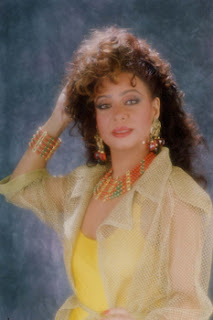Samia Gamal (in Arabic: سامية جمال, born as Zaynab Ibrahim Mahfuz, 27 May 1924 – 1 December 1994) was an Egyptian belly dancer and film actress.
Some of her Videos:
Born in the small Egyptian town of Wana in 1924, Samia's family moved just months later to Cairo and settled near the Khan El-Khalili bazaar. It was many years later that Samia Gamal met Badia Masabni, the founder of modern Oriental dance.
Badia offered Samia an invitation to join her dance company, which
Samia accepted. Badia Masabni gave her the stage name Samia Gamal, and
she began her dance career.
At first, she studied under Badia and Badia's star dancer at the time, Tahiya Karioka.
However she soon became a respected soloist and brought forth her own
style. Samia Gamal incorporated techniques from ballet and Latin dance
into her solo performances. She was also the first to perform with
high-heeled shoes on stage. She starred in dozens of Egyptian films next
to the famous Farid Al Attrach. They could be thought of as the Fred Astaire and Ginger Rogers
of the Middle East. They not only played each other's love interest on
the silver screen but also in real life. However, their love was not
meant to be. Because of Farid's social position, he refused to marry
Samia. Farid believed that marriage kills artist talent, he never married. Some claim that Farid as a Druze
prince, told her it would bring too much shame to his family for him to
marry a belly dancer; but the claim is baseless. Farid helped placing
Samia on the National Stage by risking all he owned, and managed to
borrow to produce a film (Habib al omr) co-starring with her in 1947.
In 1949, Egypt's King Farouk proclaimed Samia Gamal "The National Dancer of Egypt", which brought US attention to the dancer.
In 1950, Samia came to the US and was photographed by Gjon Mili. She also performed in the Latin Quarter, New York's trendy nightclub. She later married the so-called "Texas millionaire" Shepherd King III, whom, it was later reported only had about $50,000. However, their marriage did not last long.
In 1958, Samia Gamal married Roshdy Abaza,
one of the most famous Egyptian actors with whom Samia starred in a
number of films. Samia Gamal stopped dancing in 1972 when she was nearly
in her 50s but began again after given advice by Samir Sabri. She then danced until the early 1980s.
Samia Gamal died on 1 December 1994, at 70 years of age in Cairo.
Samia's charismatic performances in Egyptian and international films
gave Oriental Dance recognition and admiration in Egypt and worldwide.
Samia Gamal and Farid Al-Attrach in the Egyptian film Afrita hanem (Genie Lady) (1949)
Some of her Videos:







